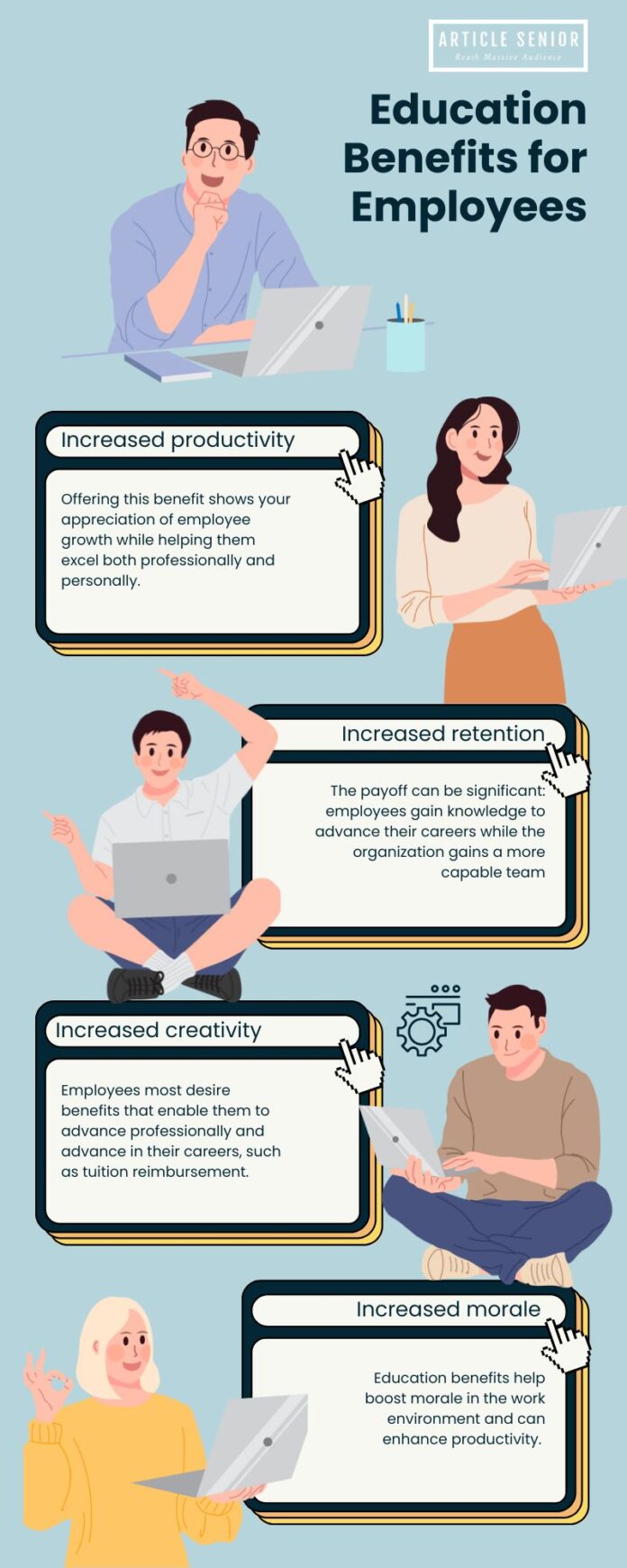Education benefits can be among the most desirable perks offered to employees. Offering these educational opportunities can level the playing field and enable workers to realize their professional ambitions more readily.
Tuition assistance programs are an increasingly popular education benefit, providing employees with a reimbursement for educational costs as long as they fulfill certain stipulations – for instance passing courses and finishing degrees.
Increased productivity
Staff with the necessary skills for their jobs are better able to complete them faster and more efficiently, which is particularly vital in high-demand industries where lack of qualified workers could result in slower growth or even revenue losses.
NetSuite’s 2021 employee perk survey discovered that tuition reimbursement programs ranked higher than paid sick days and retirement contributions as desired employee perks. Offering this benefit shows your appreciation of employee growth while helping them excel both professionally and personally.
Education benefits for Employees as they know that their employer is investing in their future, even if they may not immediately use an education assistance program. This gives employees confidence in their role at your company and may reduce turnover as employees feel secure within it rather than look elsewhere for higher pay elsewhere.
Employees with more education tend to innovate more in their work. Innovation increases productivity and profits for businesses, leading them to raise wages of their employees; employees spend these higher wages on goods and services which stimulates the economy – this cycle continues until equilibrium is reached – where original upward shift in demand meets long-run supply of labor.
Increased retention
Employee benefits for learning are crucial. Employees report time or financial barriers as the major hurdles to furthering their education, making employee benefits for learning even more essential. A survey by Bright Horizons indicates that employees participating in company-funded education programs experience greater job satisfaction and loyalty – something which could help companies attract top talent while simultaneously expanding their workforces – not to mention potentially cutting the costs associated with hiring specialists for specialist positions.
Organizations are investing not only in traditional benefits like health insurance and vacation time, but increasingly also in educational programs for their workers. The payoff can be significant: employees gain knowledge to advance their careers while the organization gains a more capable team. According to research from Lumina Foundation, every dollar invested in tuition reimbursement yields 129% return in lower acquisition costs, productivity improvements and autonomy gains.
Organizations have long provided educational benefits as part of employee incentives, but this time around they’re targeting more frontline and disadvantaged workers more quickly and with greater generosity than before. Instead of targeting only MBAs or white collar professionals with this benefit, more employers are offering it to individuals who never attended college – providing access to education that will prepare them for various career paths while equipping them with necessary skills for future advancement.
Increased morale
Employees with quality education backgrounds tend to possess higher morale, which can be immensely advantageous for businesses. This is likely because employees with advanced degrees generally receive higher salaries, providing them with increased job satisfaction and thus helping to boost morale within an entire company and contribute towards continued success and an enhanced business reputation.
Many companies are providing education benefits for employees, including tuition reimbursement or student loan repayment plans. This has become an increasingly popular way for companies to attract and retain top talent; studies have demonstrated that employees who receive such educational benefits tend to stay longer at their current company due to the new skills acquired through receiving them allowing them to advance within it.
Education benefits help boost morale in the work environment and can enhance productivity. Employees that feel happy at work will be more motivated to set more ambitious goals for themselves and achieve them more quickly, which may ultimately contribute to longer and healthier lives for all concerned.
Employees who are satisfied in their jobs tend to enjoy better relationships and higher quality of life, making them a key ingredient in building a productive workforce. Businesses should emphasize these benefits during hiring processes to attract top talent while keeping current workers happy with their roles. It’s crucial that all employees understand these advantages so they can attract and keep key talent onboard.
Increased productivity
Employees most desire benefits that enable them to advance professionally and advance in their careers, such as tuition reimbursement. Such programs show employees that their company cares about them as individuals — something which increases morale while discouraging employees from leaving for companies offering better perks.
As it’s essential that employee benefits don’t become less valuable if overly restricted, setting conditions that allow your educational benefits for employees can go a long way towards increasing value.
As our economy faces a skills gap, companies must provide employees with opportunities for further education to keep their careers relevant and successful. Tuition reimbursement benefits and employee development opportunities are great ways of doing just this and can help you recruit and retain top talent within their industry.

